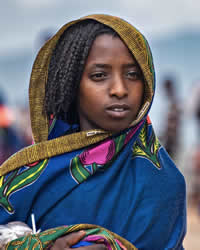Oromo, Borana in Ethiopia

Photo Source:
Rod Waddington - Flickr
Creative Commons
|
Send Joshua Project a map of this people group.
|
| People Name: | Oromo, Borana |
| Country: | Ethiopia |
| 10/40 Window: | Yes |
| Population: | 1,642,000 |
| World Population: | 1,944,000 |
| Primary Language: | Oromo, Borana-Arsi-Guji |
| Primary Religion: | Ethnic Religions |
| Christian Adherents: | 4.00 % |
| Evangelicals: | 1.30 % |
| Scripture: | Complete Bible |
| Ministry Resources: | Yes |
| Jesus Film: | Yes |
| Audio Recordings: | Yes |
| People Cluster: | Oromo |
| Affinity Bloc: | Horn of Africa Peoples |
| Progress Level: |
|
Introduction / History
The various Oromo people groups are the largest, most widely dispersed groups in Ethiopia. They also reside in Kenya, Somalia and Egypt. Composed of approximately a dozen tribal clusters, these peoples prefer just the term "Oromo" when speaking of themselves. Nearly all of these peoples speak mutually intelligible dialects of a language called "Oromo, Borana-Arsi-Guji". Although they retain similarities in their descent system, they differ considerably in religion, lifestyle and political organization. The Oromo have various clans, including the Borana. Most likely they were pushed westward from the Horn of Africa by the Somali during the tenth century. Together with the Amhara and the Tigrai, they dominated the government and military classes of the Ethiopian Empire. In the 1700s and 1800s, these peoples became a prominent force in Abyssinian (Ethiopian) politics. During the nineteenth century, they converted to Islam.
What Are Their Lives Like?
The Borana are a large sub-tribe of the Oromo people, but they differ significantly from other Oromo people in lifestyle and religion. Some experts claim that there are only 873,000 Borana in southern Ethiopia; other experts state that there are at least seven million people who identify themselves as Borana. Most of this group is semi-nomadic pastoralists who live in the desert. Like many other nomadic groups in east Africa, they suffer greatly from drought and famine as well as tribal battles. They value belonging to a group, which they call "tokuma," and they have a reputation for being sociable, hospitable and easy-going. They get their water from rivers, and they lack medical services.
What Are Their Beliefs?
The majority of the Borana Oromo are Muslim; however, they still practice their traditional religion. These ethnic religionists worship a supreme being named Waqa. Wadaja feasts are organized on various occasions, and they sacrifice livestock in Waqa's honor. Today, these feasts reflect a Muslim influence. Borana Oromo believe that objects such as trees, springs, and rocks have spirits. They also believe that spirits called jinn may take possession of people. Adults fast during Ramadan (the Muslim holy month), but few celebrate other Muslim festivals.
What Are Their Needs?
Oromo villages usually have no electricity. Medical care is poor, and access to medicine is limited. Their water supply comes from rivers and springs. Today, there is a great need for Christian workers among the Oromo. Also, leadership training and discipleship of new believers is critical if growth is to continue, and new churches are to be planted. There is potential for Oromo movements to Christ, but workers must go!
Prayer Points
Pray for workers to go to each Oromo people, especially the Borana clan. Pray for Oromo disciples to make other disciples who will make even more disciples!Pray for spiritual hunger among the Borana Oromo people, especially their leaders. Pray for the Lord to show himself powerful and loving by providing abundance to the Borana Oromo people.